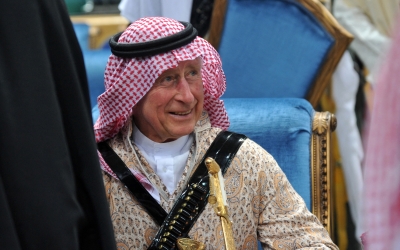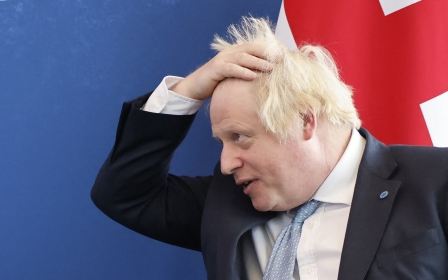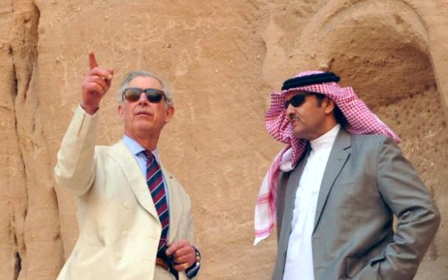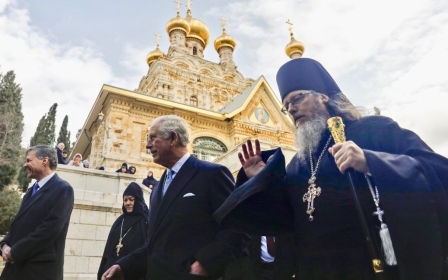Prince Charles accepted $1.6m from family of Osama bin Laden: Report
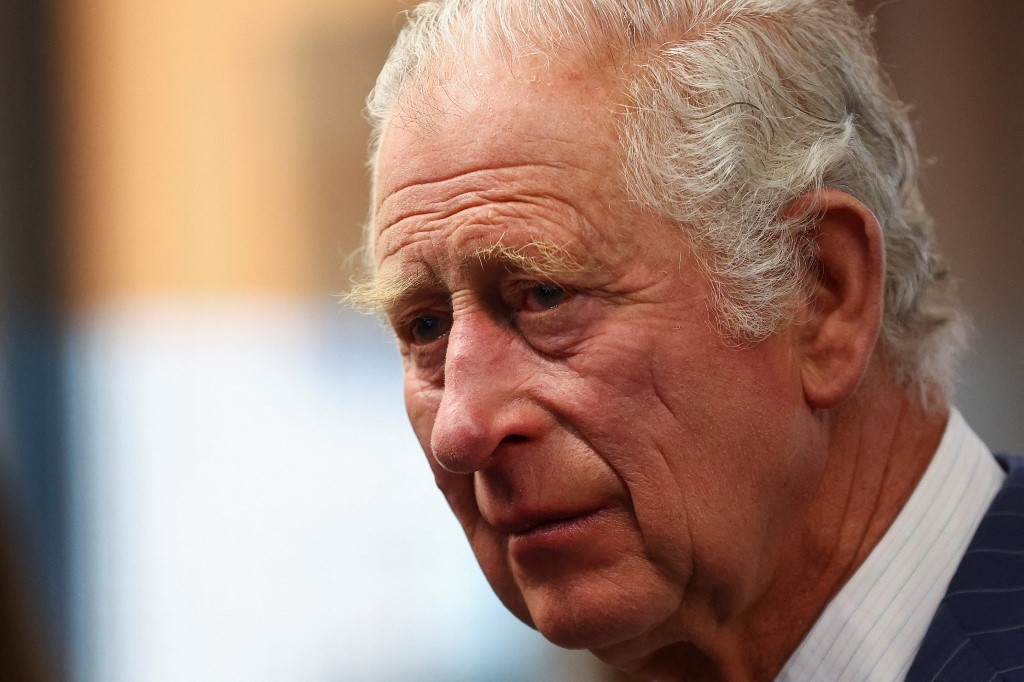
The Prince of Wales accepted £1m from the family of Osama bin Laden, the former al-Qaeda leader, according to a report published in the Sunday Times.
Prince Charles personally secured the money, worth $1.6m at the then exchange rate, from Bakr bin Laden, the head of the wealthy Saudi family, and his brother Shafiq, the UK newspaper said on Saturday.
Both men are half-brothers of Osama bin Laden, the founder of al-Qaeda who masterminded the 11 September, 2001, attacks against the US.
According to the Sunday Times, Prince Charles brokered the payment after a private meeting with Bakr, now 76, at Clarence House, the prince's personal residence in London, on 30 October 2013, two years after Osama bin Laden had been killed by US special forces in Pakistan.
'The fact that [he] was choosing to broker deals with a name and a family that not only rang alarm bells, but [aroused] abject horror around the world... why would you do this?'
- Source close to Prince Charles
The heir to the British throne agreed to the donation despite objections from advisers at Clarence House and the Prince of Wales's Charitable Fund, where the money was deposited, the newspaper said.
New MEE newsletter: Jerusalem Dispatch
Sign up to get the latest insights and analysis on Israel-Palestine, alongside Turkey Unpacked and other MEE newsletters
According to sources, several of the prince's advisers pleaded with him to return the money.
One of his household staff said it would cause national outrage if the news leaked to the press. They reportedly told the prince that "it would not be good for anybody" if it emerged that he had accepted money from the family of the perpetrator of the 9/11 attacks, which resulted in the murder of 67 Britons alongside thousands of Americans.
According to the newspaper, one source said: "The fact that a member of the highest level of the British establishment was choosing to broker deals with a name and a family that not only rang alarm bells, but [aroused] abject horror around the world... why would you do this? What good reason is there to do this?"
Charles was said to have felt it would be too embarrassing to hand the money back and feared the brothers would suspect the reason.
One household staff member believes they were "very vociferous" with the prince but were "shouted down". Another adviser to Charles is said to have implored the prince to return the money, but was apparently ignored.
Out of favour
According to the Sunday Times, a Clarence House source insisted that Prince Charles's aides were not dismayed by the bin Laden donation, and that the decisions about whether to accept money fell within the remit of trustees.
A statement from the Prince of Wales's Charitable Foundation said the decision to accept the donation was taken wholly by the trustees and "any attempt to suggest otherwise is misleading and inaccurate," according to a report in the Guardian.
There is no suggestion that either Bakr or Shafiq bin Laden has sponsored or been involved in acts of "terrorism".
As half-brothers they are related to Osama bin Laden through their father, Mohammed bin Awad bin Laden, a Yemeni-born billionaire who became the wealthiest non-royal Saudi after founding the BinLadin Group, a Jeddah-based construction firm.
He died in a plane crash aged 59 in 1967, when Osama was 10 years old.
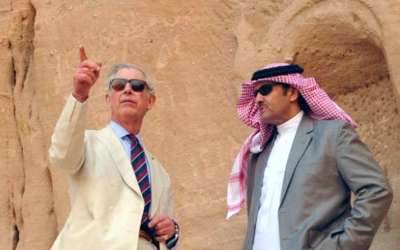
Bakr took over the company, but fell out of favour with the Saudi monarchy in 2015 after an accident at one of his projects resulted in the deaths of 100 people.
Two years later, Crown Prince Mohammed bin Salman rounded up Bakr and two of his other brothers, Saad and Salah, during an "anti-corruption drive" and held them in detention. Bakr was released last year.
The bin Laden family's relationship with the prince's charities has never previously been disclosed and does not appear in public documents. Charities are not required to disclose their supporters.
However, it is not the first time the prince has been embroiled with the bin Laden family. He dined with Bakr to discuss the Islamic faith in October 2001, just two weeks after the September 11 attacks.
According to an account of their initial meeting in 2000, the pair were introduced by Prince Khalid Al-Faisal Al Saud, the third of eight sons of the late King Faisal bin Abdul Aziz Al Saud, during a fundraising dinner for the Oxford Centre of Islamic Studies, of which Charles is patron.
The prince is widely reported to have asked Bakr: "What's your brother up to these days?"
The bin Laden family formally disavowed Osama decades ago, but has long been dogged by their association. On 19 September 2001, eight days after the attacks, 13 members of the family left the US aboard a privately chartered plane of Saudi nationals.
Police investigation
In February this year, UK police launched an investigation into a bid to give honours and British citizenship to a Saudi national linked to the charity of the Prince of Wales.
London's Metropolitan Police Service said it was investigating allegations of offences under the Honours (Prevention of Abuses) Act 1925.
The police force said in a statement: "The decision follows an assessment of a September 2021 letter.
"This related to media reporting alleging offers of help were made to secure honours and citizenship for a Saudi national.
"The Special Enquiry Team has conducted the assessment process which has included contacting those believed to hold relevant information.
"Officers liaised with the Prince's Foundation about the findings of an independent investigation into fundraising practices. The foundation provided a number of relevant documents."
Prince Charles's former closest aide, Michael Fawcett, stepped down from his role as chief executive of the Prince's Foundation in late 2021 amid claims he promised to help secure a CBE and British citizenship for Saudi national Mahfouz Marei Mubarak bin Mahfouz, a donor to the foundation.
According to a report in the Times, businessman Mahfouz had been seeking to obtain citizenship through a so-called "golden investment" visa, paying intermediaries tens of thousands of pounds to put him in contact with the prince after being advised that awards would help his application.
Prince Charles's office stressed that he had "no knowledge" of allegations relating to the offer of honours "on the basis of donation to his charities".
Qatari cash
Last month, the Sunday Times revealed that Prince Charles had accepted a suitcase containing €1m ($1.05m) in cash from a former Qatari prime minister.
The handover was one of three lots of cash, totalling $3.15m, which the prince personally received from Sheikh Hamad bin Jassim bin Jaber Al Thani, between 2011 and 2015, the newspaper said.
The handovers are alleged to have occurred during meetings between the two men, including a private one-to-one meeting at Clarence House in 2015.
In a statement, a spokesperson for Clarence House said the money given during the 2015 meeting was "passed immediately to one of the prince's charities who carried out the appropriate covenants and assured us that all the correct processes were followed".
The suitcase containing the $1.05m was given to two of Charles' advisers, who are said to have hand-counted the money, which comprised of now discontinued €500 notes.
Coutts, the private bank that acts for the royal family, was then asked to collect the cash. Each payment was deposited into the accounts of the Prince of Wales's Charitable Fund.
The Sunday Times said there was no suggestion the payments were illegal. The newspaper said the prince's meetings with Sheikh Hamad do not appear in the Court Circular, the list of official engagements undertaken by working royals.
The royal gift policy states that members of the royal family are allowed to accept a "cheque" as a patron of, or on behalf of, a charity. It does not reference what should happen regarding cash payments.
Sir Alistair Graham, the former chairman of the committee on standards in public life, told the Sunday Times the revelations were "truly shocking" and would be "inconceivable" to most people.
Graham, 79, said: "I wouldn't make a distinction between a politician and a member of the royal family.
"If the Qatari government wants to make a gift to his foundation, then there are proper ways to do these things rather than handling large sums of cash."
This article is available in French on Middle East Eye French edition.
Middle East Eye delivers independent and unrivalled coverage and analysis of the Middle East, North Africa and beyond. To learn more about republishing this content and the associated fees, please fill out this form. More about MEE can be found here.


